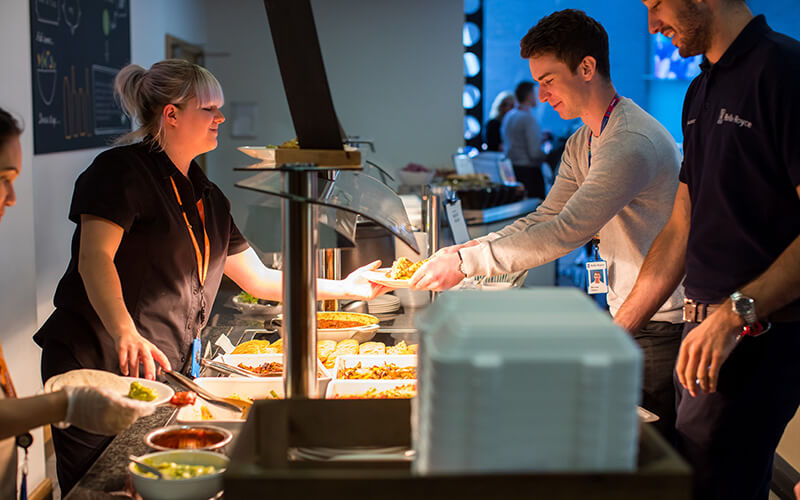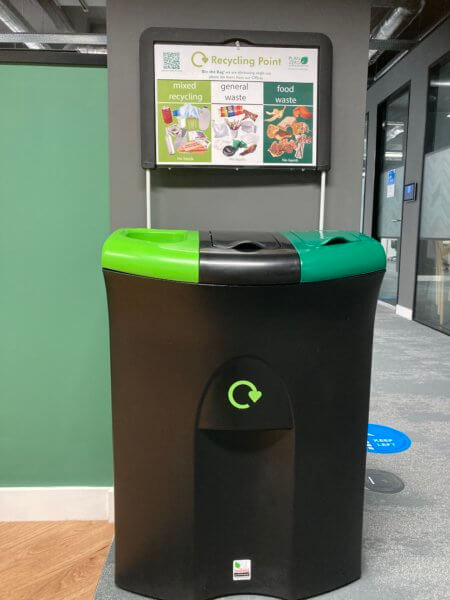Why your organisation should significantly cut its food waste
The UN Environment Programme (UNEP) Food Waste Index Report 2021 estimates that 931 million tonnes of food, or 17% of total food available to consumers, was wasted globally in 2019.
In a call to action, they said, “If we want to get serious about tackling climate change, nature and biodiversity loss, and pollution and waste, businesses, governments and citizens around the world have to do their part to reduce food waste.”

The UNEP has set a global target for countries to halve food waste by 2030. The UK government has set an initial target to reduce food waste by 20% by 2025. There’s a lot that your organisation can do to support the government target and there are benefits to be gained as a result.
In this article, we’ll explore how reducing food wastage through waste management can save your organisation money and help the environment.
Reduce food waste and cut costs
Waste and Resources Action Programme (WRAP) has calculated that for every £1 invested in food waste management, an organisation stands to make £14 in savings. Costs like transporting waste to landfill and business landfill taxes can all be avoided with the right food waste management procedures in place. This equates to huge potential savings from minimising food waste across your organisation’s operations.
Food waste reduction strategies start with monitoring and measuring food wastage to identify areas where savings can be made. Efficient procurement processes can deliver the right amount of food for your operation at the right time, and employee awareness campaigns can inform employees how to avoid wasting food whilst on your premises.
Make your organisation more sustainable
Food production, transportation, packaging and waste are all harmful to the environment when you consider the energy consumed and lost through these processes. And then there’s the greenhouse gases produced. According to the Intergovernmental Panel on Climate Change, food waste contributes 8% to 10% to total man-made greenhouse gases and if food waste were a country, it would be the third largest emitter after China and the USA.

At a time when climate change is in the spotlight, and organisations are expected to play their part in fighting it, recycling unwanted food can significantly help your organisation’s sustainability efforts.
How Network Rail worked with Mitie to turn food waste into a resource
Food waste recycling can be deployed in ways that can produce energy and reduce your organisation’s reliance on less environmentally friendly energy sources. It is something that Mitie has already rolled out for Network Rail, where 120 tonnes of food waste were generated every year at its head office in Milton Keynes. Around 80% of this waste now goes into an on-site digester, which converts it into biomass in just 12 hours. Not only does this effectively produce ‘free’ energy for the building, it also reduces the cost of food waste collection.
Food waste disposal technology eases the process
Recycling energy through digestion is not the only way your organisation can make better use of food waste. Redistributing unused food to charities and community groups is a welcome and valuable option. Any leftover food that is unsuitable for human consumption, can be composted or used for animal feed. And if there is no option but to send food to landfill, technology can help limit the amount of waste, which saves on its collection and disposal.

Two approaches, which Mitie has used successfully in recent years, include:
- Dewatering: where food waste is pulped to remove as much water as possible. This can reduce its bulk by as much as 60%, and also reduces the risk of it rotting and causing foul smells or spreading germs. This has proved to be a good alternative to macerators, which are now banned in commercial kitchens in the UK.
- Drying: this method turns food waste into dry matter, similar to coffee grounds or soil, which can then be used as biomass or compost. Once dried it can’t putrefy and it is far less likely to attract maggots, flies and rodents. However, the drying process uses considerable amounts of electricity, so it is worth taking advice on whether the energy cost makes it a viable solution.
Using these methods, combined with others, Mitie helped a leading food wholesaler slash the costs of food waste management. As a result, the wholesaler adopted a long-term waste reduction strategy to cut the amount of food waste generated at 37 depots across the UK.
Find out how Mitie Waste Management can help your organisation reduce its food waste
Mitie is an expert in helping organisations, in the public and private sectors, reduce the amount of food waste they generate and send to landfill. We have both the experience and access to technology to create a more cost-effective and sustainable approach to food in your organisation.
Talk to our team today to find out more and discuss your specific waste reduction plans. Or, take a closer look at our waste management services.
Read next

9 ways to reduce office waste
Now more than ever, people are aware of the need to behave more sustainably and reduce our negative impact on the environment and climate. You may have made changes already, like switching to a…

Case study: Rail company reduces food waste by 80%
Working in partnership with Mitie, Network Rail have installed a food waste digester that can convert food waste into biomass in just 12 hours.
Bidfood appoints Mitie to support their waste reduction strategy
Mitie will boost sustainability for food wholesaler Bidfood as part of a new five-year contract covering all aspects of waste management.
 Skip to content
Skip to content
